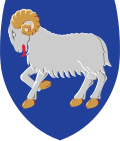 |
|---|
This is a list of Faroese members of the Folketing, the parliament of Denmark. Under the 1953 Constitution, the Faroe Islands elect two members of the Folketing. [1] From 1849 to 1953 the Folketing was one of the two houses in the bicameral parliament known as the Rigsdag; the other house was known as the Landsting. Greenland also elects two members of the Folketing, which alongside the Faroese members are called the North Atlantic mandates (da).